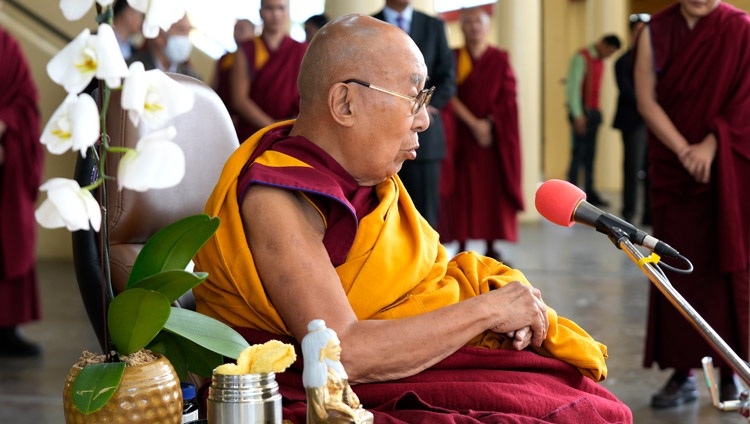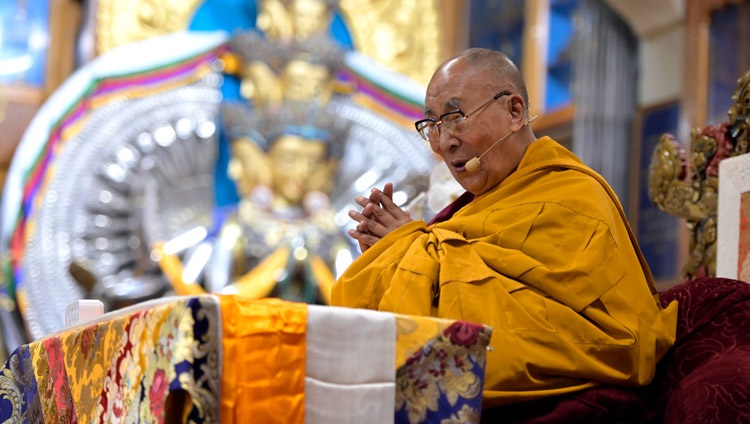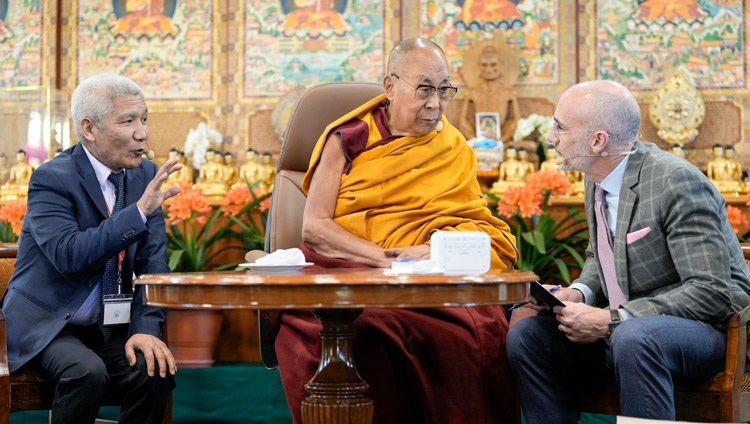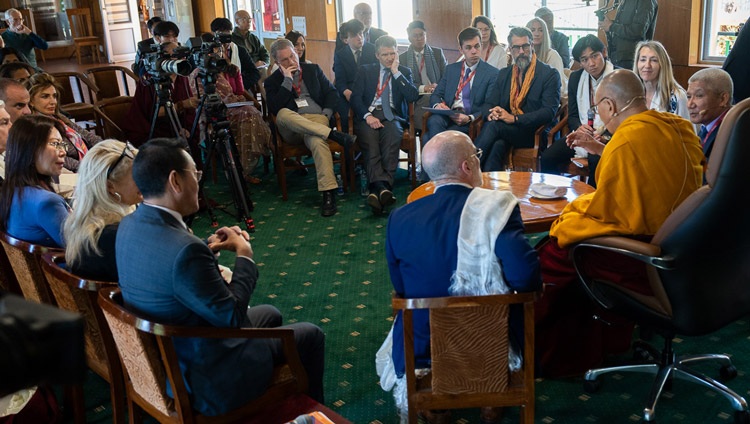Second Day of ‘Buddhapalita’ Teachings for SE AsiansAugust 30, 2017
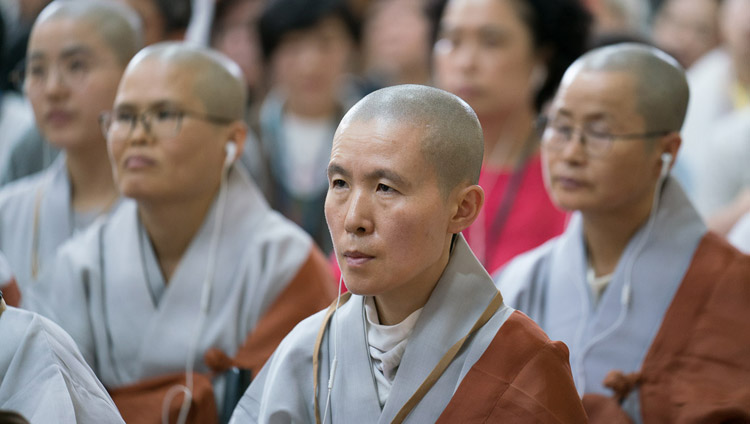
His Holiness completed the introductory prayers with a verse of Praise for the Perfection Wisdom:
Homage to the Perfection Wisdom,
The Mother of all Buddhas of the three times,
Which is beyond words, inconceivable, inexpressible,
Unproduced and unobstructed, in the nature of space,
The objective domain of self-aware wisdom.
Tatyatha – gateh, gateh, paragateh, parasamgateh, bodhi svaha
“Today is the second day of the teachings,” he remarked, “And I’m going to go through the text.
“All living beings experience pain and pleasure. Instinctively we don’t want to suffer, we want to be happy. Pain and pleasure arise from causes and conditions and as human beings able to think about the past and the future we can consider what these are. What is clear is that feelings of pleasure and pain related to our mental experience are stronger and more effective than those related to our physical experience.”
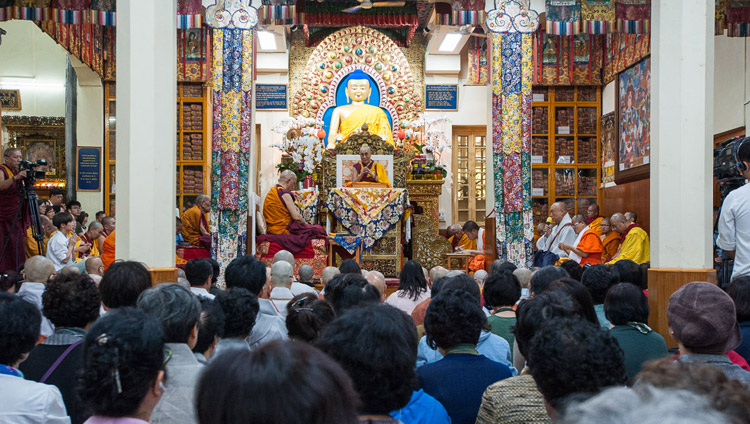
His Holiness speculated about when physical organisms evolved to a point that they became a basis for consciousness. He cited several different calculations for when the Big Bang took place. He mentioned that the traditional Buddhist account of the appearance of human beings begins with self-illuminating and self-sustaining divine beings appearing in the world. Gradually they developed a need for coarse food and humans came into being.
He observed that religion is a solely human interest—animals are not religious. The common religious message about the value of love and compassion is a reflection of basic human nature. Commenting that faith in a higher power can be very helpful, His Holiness remarked that we still need to give thought to how to cultivate happiness.
“The Buddha said, ‘You are your own master’ and advised ‘Commit not a single unwholesome deed, Cultivate a wealth of virtue, To completely tame this mind of ours—That is the teaching of the Buddhas.’
“We suffer because our minds are unruly—we have to tame them. Some Westerners have told me that Buddhism seems less of a religion and more of a science of mind. Since it is about transforming the mind, not through prayer, but by tackling our emotions, they may be right. Disturbing emotions tend to arise spontaneously as an instinctive response, whereas great compassion arises as a result of our efforts to cultivate it.”
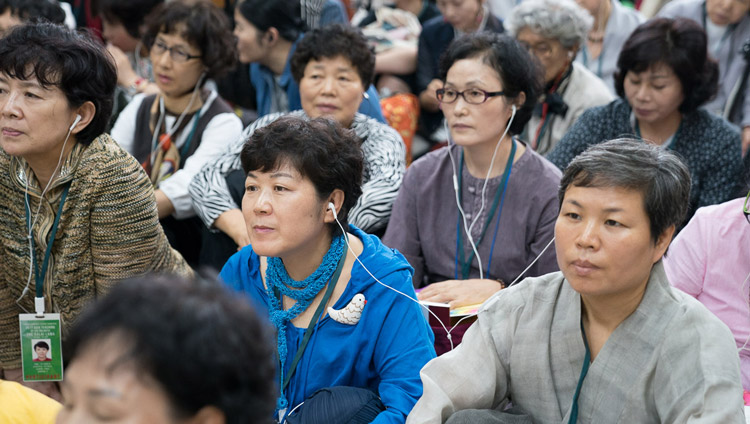
His Holiness mentioned that followers of Indian traditions other than Buddhism also have experience of training in concentration and so forth. He has heard reports of yogis who live high in the Himalayas who cultivate inner heat and other attainments. He said he had hoped to have an opportunity to discuss their experiences with some of them at the Kumbh Melas he has been invited to, but unfortunately bad weather prevented him attending.
He acknowledged that where such practitioners generally assert the existence of an ‘atman’ or a permanent, independent self, the Buddha taught that clinging to the idea of such an independent entity was something to be overcome. He taught that this fundamental ignorance is at the root of disturbing emotions like anger and hatred. It is also the source of self-centred attitudes that give rise to divisive emotions like jealousy, competitiveness, covetousness and malice.
Summarizing the Buddhist path, His Holiness said that the aspect that involves skilful means deals with cultivating a far-reaching concern for others, while the aspect of wisdom involves realizing the selflessness of self and phenomena, understanding that they have no true existence. Reducing the sense of reification in this way will help reduce negative emotions.
“This need to control negative emotions is something I try to make people aware of wherever I go. All of us here are Dharma brothers and sisters and we can all see how we can contribute to ensuring greater happiness in the world—not by spreading Buddhism as such, but by helping people reduce their negative emotions.”
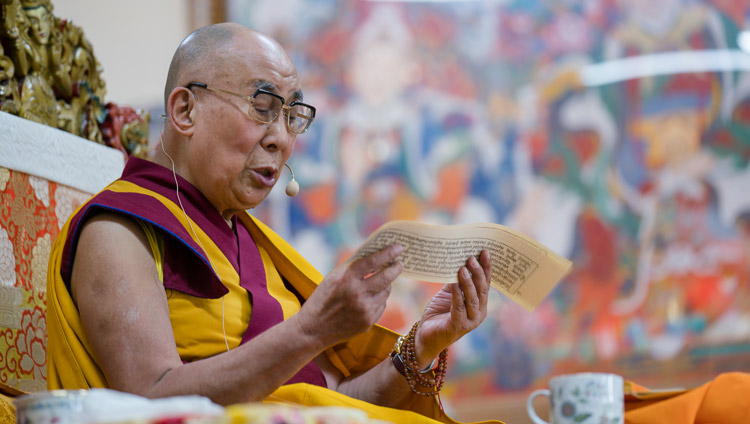
Opening Buddhapalita’s commentary to Nagarjuna’s ‘Fundamental Wisdom’ he reiterated that Nagarjuna had focussed on the explicit content of the Perfection of Wisdom teachings—emptiness. He was reminded that recently looking out of a window at traffic in Mumbai had brought to mind a verse from the Seventh Dalai Lama’s ‘Song of the Four Mindfulnesses’:
At the cross-roads of the varieties of appearances and the six consciousnesses
Is seen the confusion of the baseless phenomena of duality,
The illusory spectacles of a deceiving magician are there.
Not thinking they are true, look to their entity of emptiness,
Not letting your mind stray, place it within appearance and emptiness,
Making your attention unforgetful, maintain it within appearance and emptiness.
His Holiness reminded his listeners that the way to approach Nagarjuna’s ‘Fundamental Wisdom’ is to read Chapter 26 first because it deals with topics held in common with the Pali Tradition—that ignorance is the root of suffering. To understand how to counter that read Chapter 18 and after that Chapter 24, which rehearses arguments between proponents of the Realist School and the Middle Way School. Where the Realists object that if things have no intrinsic existence explanation of the Four Noble Truths cannot be sustained, Nagarjuna tells them they have not understood the purpose and meaning of emptiness. He cites the powerful reasoning of dependent arising—if things arise in dependence on causes and conditions they cannot be independent.
His Holiness read steadily through the text and completed the first chapter. The teaching will continue tomorrow.

